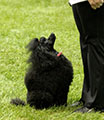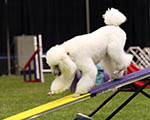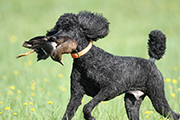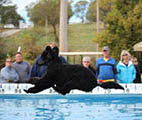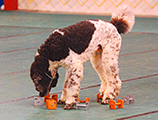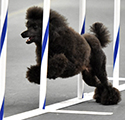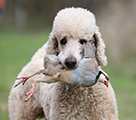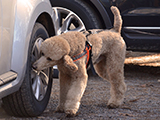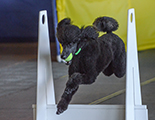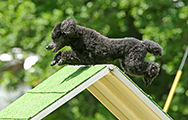Fact Sheet
The Stud Dog
To ensure that only representatives of the breed with superior traits and/or useful diversity are used at stud and to offer a responsible management program for the stud dog owner.
Since a stud dog, in his lifetime, may have a far greater impact on a breed than any bitch can have in her lifetime, it is important that he be structurally correct (no major faults or disqualifications) according to the breed standard. He should have a superior temperament (no shyness or aggression).
He should be tested for genetic health disorders. A dog which tests positive for any genetic health disorder should not normally be used in a breeding program, but there may be exceptions. Correctly using a DNA test for a disorder caused by a recessive mutation allows an affected or carrier mate to be used with a mate that tests normal thus ensuring that the breeding will not produce affected offspring. The offspring would then be used appropriately after testing. This is sometimes done to prevent loss of genetic diversity.
A dog that has produced offspring with life threatening or life shortening genetic health disorders for which there is no DNA test is considered a carrier and should not be bred since statistically 50% of the offspring will be carriers for the disorder(s). In those circumstances where it is absolutely necessary to breed a known carrier, great care should be taken to ensure that the bitch he is bred to is not a carrier for the same disorder. All offspring should be monitored throughout their lifetime for evidence of the disorder.
Recommendations are different for polygenic diseases such as Addison’s Disease and hip dysplasia. Dr. Jerold Bell writes about polygenic disease in the following article, entitled Managing Polygenic Disease, and he uses hip dysplasia as an example:
https://www.vin.com/apputil/content/defaultadv1.aspx?meta=&pId=11165&id=3848681
Applying Dr Bell’s breeding advice to Addison’s Disease, breeders can follow the same strategy they employ to avoid hip dysplasia or other known genetic health disorders and thereby improve their risks:
- Affected dogs should not be bred.
- A dog with close and/or multiple Addisonian relatives should not be bred to another with similar risks.
- The only reason to use a dog with close Addisonian relatives would be to protect genetic diversity, and only with exceptional quality. High risk dogs should be bred sparingly and only to those with very few Addisonian relatives in their lines.
- If there are lower risk offspring or parents of the same quality, then producers and offspring of Addisonian should be not be bred, but replaced with the lower risk dogs in the breeding program.
- In addition to numbers of related Addisonian dogs, breeders should consider each affected dog’s age of onset, severity of onset and any extreme environmental exposure to determine different levels of risk when assessing depth and breadth of pedigree.
You should exchange copies of test results with the brood bitch owner or check testing results on the Orthopedic Foundation for Animals site at http://www.ofa.org/. The stud dog owner should be concerned that the use of his stud would preserve the breed and provide betterment to the breed. The choice of a stud dog should be based on compatible pedigrees rather than flashy advertising and pretty pictures. Current information suggests that using DNA testing to help increase Diversity, especially in the standard poodle population, will also decrease incidence of autoimmune disease. Information regarding the Poodle Diversity Project may be found at:
- http://poodlesdegrenier.com/poodle-diversity-project
- https://www.vgl.ucdavis.edu/services/dog/GeneticDiversityInStandardPoodles.php
- http://poodlediversity.com/
A dog should be tested for brucellosis (a highly contagious venereal disease) prior to each stud service or at least annually. A male with the brucellosis bacteria will become sterile or produce abnormal sperm.
The owner of a stud dog must screen all incoming bitches to ensure that they meet the same standards as required above; i.e., no major structural faults or disqualification, a stable temperament, and all genetic test results are normal.
Many breeders who use a stud dog that is not local for natural cover breeding now utilize fresh chilled or frozen semen which can be shipped by overnight delivery to a theriogenologist (a veterinarian who specializes in canine reproduction) for artificial insemination. You should contact your veterinarian and plan for this well in advance of the time so that necessary supplies have been ordered. Discuss the additional fees with the bitch owner if you do not include the fees in your total contract. If you do not have a veterinarian available who is skilled in this process, then you should not offer this type of service to the bitch owner.
If the stud dog owner chooses to accept shipped bitches for live cover, then the owner of the stud dog must provide a safe and clean environment in which to house incoming bitches. Bitches should be housed separately from all other dogs. The owner of the stud dog must ensure that the breeding will be handled responsibly so that the bitch is not traumatized or injured during the mating. If the owner of the stud dog has accepted the bitch for service, then every effort should be made to ensure that the service is completed in a timely manner that ensures a litter for the bitch owner. If it is necessary to obtain progesterone testing for the bitch owner, then the fees should be discussed with the owner and the stud dog owner should take responsibility to assist as possible if the bitch is in his custody or control. A bitch should be bathed prior to being returned to her owner.
A contract should be used which outlines all agreed upon conditions such as return service or stud fee in the event the bitch does not conceive, the amount of the stud fee and when it is payable, extra fees for housing and care of the bitch, if applicable, transportation charges to and from the airport or the vet, etc. Sample contracts are available at http://vipoodle.org/education/educational-publications/and can be modified to reflect the terms of your agreement with the brood bitch owner.
The information contained in these documents is current at the time of this writing and is accurate to the best of VIP’s knowledge.
This information has been provided to you at no charge. You are free to use it provided it is used in its entirety with no changes or alterations and that the copyright remains intact. If you have found this information to be helpful, please consider making a tax-deductible donation to:
Versatility in Poodles
4061 Highlands Rd
Franklin, NC 28734
To make a donation via PayPal, please click the Donate Button:
The contents of the www.vipoodle.org website, such as text, graphics, images, and other material contained on this site (“Content”) are for informational purposes only. The Content is not intended to be a substitute for professional veterinarian advice, diagnosis, or treatment. Always seek the advice of your veterinarian with any questions you may have regarding the medical condition of your pet. Never disregard professional advice or delay in seeking it because of something you have read on this website!
If you think your pet has a medical emergency, call or visit your veterinarian or your local veterinary emergency hospital immediately. Versatility in Poodles and www.vipoodle.org do not recommend or endorse any specific veterinarians, products, procedures, opinions, or other information that may be mentioned on this website. Reliance on any information appearing on this website is entirely at your own risk.


